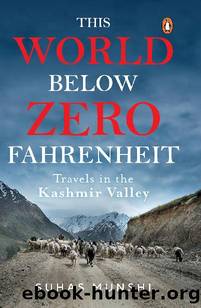This World Below Zero Fahrenheit by Suhas Munshi

Author:Suhas Munshi [Munshi, Suhas]
Language: eng
Format: epub
Publisher: Penguin Random House India Private Limited
Published: 2021-02-22T00:00:00+00:00
It is probably due to the Kashmiriâs inaptitude for active amusement that the strolling players, the Band or Bhaggat, have such a hold on the people. These players, who are well known in India, are enthusiastically received and their wit and power of mimicry entitle them to a warm reception.
Lawrence uses the name âBhaggatâ as a synonym for bhands, which is probably a fair indication of how dominant the Bhagats were in the field. He goes on:
I have seen the best companies in Kashmir, though perhaps the bestâthe Bhaggats of Syebugâdied off in the famine of 1877 . . . The Bhaggats portray village life in a most vivid manner. Their dresses and make-up are excellent and they represent most faithfully the internal working of a village community. It is said that Maharaja Gulab Singh acquired a very intimate knowledge of village administration from the Bhaggatsâ performances and I have picked up some hints from them as to the methods of the patwari, the village accountant.â
The Bhands, Lawrence adds, ârelieve the sadness of village life in Kashmir.â
Basheer Ahmad Bhagatâs family officially started performing Bhand Pathers in 1959. The founding member of the group was Ghulam Rasool Bhagat, who went on to win a Sangeet Natak Akademi award. âHe was a man full of ideas. He helped popularize Bhand Pather on stage as well as on radio. The great theatre director and playwright M.L. Kemmu helped formalize the whole thing. We even started getting some government patronage. But just when we had started to stand on our feet, militancy broke out in the valley.â
A tradition that had flowed through centuries dried up within days. Bhands disappeared from public squares. The religious hardliners, who were now calling the shots, didnât like the idea of people singing and dancing, probably because it was their turn to be mocked. So the Bhands quietly vanished.
âIt was our desire to keep performing during those days also. In fact, we felt that performing street plays was more urgently needed then. But we didnât perform out of fear. One by one, we had to sell all the theatre equipment. Some of us became cooks, some were hired as daily-wage labourers. Shehnai used to be a central item in our plays. Shehnai hamara ek aham item hota tha. Un dino lagta tha Shehnai mar gai. Hum log andar hi andar mar rahe the. [In those days of violence it felt like the Shehnai had been silenced. And with it all of us],â Basheer says. Though he quickly adds, âNot that anyone personally threatened us. It was we who felt that it wasnât safe to go around like before.â
But a tradition that had perhaps seen far greater adversities couldnât be wished away in a few days, or months or years, by some people with guns. It flowed again.
âSee, we are illiterate people. We used to do our shows without scripts. It was all impromptu stuff. Then M.K. Raina (an acclaimed actor and director), who is my guru, came and worked with us for a long time.
Download
This site does not store any files on its server. We only index and link to content provided by other sites. Please contact the content providers to delete copyright contents if any and email us, we'll remove relevant links or contents immediately.
China Rich Girlfriend by Kwan Kevin(4558)
The Silk Roads by Peter Frankopan(4526)
Annapurna by Maurice Herzog(3464)
Full Circle by Michael Palin(3443)
Hot Thai Kitchen by Pailin Chongchitnant(3381)
Okonomiyaki: Japanese Comfort Food by Saito Yoshio(2715)
The Ogre by Doug Scott(2679)
City of Djinns: a year in Delhi by William Dalrymple(2554)
Photographic Guide to the Birds of Indonesia by Strange Morten;(2532)
Vietnam, Cambodia, Laos & Northern Thailand by Lonely Planet(2455)
Tokyo by Rob Goss(2427)
Tokyo Geek's Guide: Manga, Anime, Gaming, Cosplay, Toys, Idols & More - The Ultimate Guide to Japan's Otaku Culture by Simone Gianni(2366)
Everest the Cruel Way by Joe Tasker(2338)
Discover China Travel Guide by Lonely Planet(2222)
Iranian Rappers And Persian Porn by Maslin Jamie(2196)
China (Lonely Planet, 11th Edition)(2160)
China Travel Guide by Lonely Planet(2147)
Lonely Planet China(2141)
Top 10 Dubai and Abu Dhabi by DK Travel(2097)
